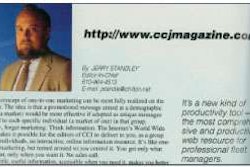What if there is no contract?
Carriers should understand the default rules of the road
Q We hauled a load for a shipper based upon a simple load confirmation sheet from a broker that had only the origin, destination and rate. We billed the broker, who has not paid because of an unfiled claim. What are our rights and obligations when
A Your question is really pretty basic under traditional principles of transportation law, but all too frequently post-deregulation shippers, brokers and carriers do not understand the statutes and regulations that govern shipper, broker and carrier duties because so frequently there is a contract that trumps all or part of the traditional shipper, broker and carrier duties. Here is an abbreviated summary of where you are.
In the absence of a contract that waives general principles of transportation law, the contract of carriage is set forth in the bill of lading receipt and carrier’s service terms and conditions that you should have published, put on your website, or at least have available to a shipper and broker upon request.
 Henry Seaton: [email protected]
Henry Seaton: [email protected]Since I assume you don’t have such written service terms and conditions, you will have to piece together the respective carrier duties based upon the bill of lading and the applicable statutes and regulations. If anything like a uniform bill of lading was issued, it will confirm that as a carrier, you were the party in possession and control of the shipment as the named carrier and accordingly had the duty to deliver the shipment intact and with reasonable dispatch. If there is a cargo claim, in the absence of a release rate, you will be responsible to the beneficial owner for the full destination market value of the shipment under the Carmack Amendment.
With respect to collection rights, the consignor and the consignee, upon acceptance of the shipment, should be liable to you for payment of the freight charges, which by regulation are still due in 15 days unless you agreed to other terms.
If you did not have any written agreement with the broker, its legal responsibilities are governed by the broker regulations. It should have billed and collected the freight charges in trust and transmitted the payments to you upon receipt. While there is old administrative rulings still on the books which say a shipper cannot offset cargo claims against freight charges, if the shipper has not paid the broker because of a claim, your recourse under this fact scenario may be to sue the shipper and the broker for the freight charges and take the consequences of the cargo damage counterclaim for which I trust you are insured.
With respect to the cargo claim, it must be filed with you in writing within nine months, assuming this time limit is set forth in the bill of lading. The claim must comply with 49 C.F.R. 370, be in writing, identify the shipment, and make a demand for a sum certain. To protect yourself, you should turn over the claim to your insurer as early as possible so as not to lose the benefits of coverage.
The bill of lading and carrier’s terms take over.
Finally, if you did not get your name on the bill of lading as the carrier of record or if the broker’s name shows up as the carrier, the above analysis could get more tenuous but I will reserve those issues for another column.
— Henry Seaton is a lawyer who represents motor carriers.
IN BRIEF
* A U.S. district judge in Arkansas last month ruled that ABF Freight System does not have standing to sue YRC Worldwide Inc. and the International Brotherhood of Teamsters over a recent concessions agreement because ABF isn’t a party to the National Master Freight Agreement. Fort Smith, Ark.-based ABF had argued that the YRC-Teamster deal violated the NMFA.
* Estes Express Lines may appeal a U.S. district court’s decision to send back to state court a class action lawsuit alleging violations of California wage and hour statutes, the U.S. Court of Appeals for the Ninth Circuit ruled.
* DHL’s liability for failing to remit to a customer collect-on-delivery payments on 21 shipments totaling $21,991.72 was limited to $100 per shipment, not the total amount, the U.S. Court of Appeals for the Fifth Circuit ruled. The appeals court agreed with a lower court’s ruling that under the terms and conditions of DHL’s contract, liability is limited unless the shipper requests and pays an additional fee for “Shipment Value Protection.”
* The president of Rock Valley, Iowa-based Tri-State Ready Mix pled guilty in federal district court to conspiring to fix prices on ready-mix concrete and sell that concrete at non-competitive prices in Iowa. Chad Van Zee’s co-conspirator, Steven VandeBrake, a former executive of another ready-mix concrete company, pled guilty in May. The conspiracy began as early as January 2006 and continued until as late as August 2009, the Justice Department said.
FMCSA: EOBR rule not ripe for review
A legal challenge to the Federal Motor Carrier Safety Administration’s new rule concerning electronic onboard recorders should be dismissed because mandates to install EOBRs won’t come until June 2012 and then will be based only on violations occurring after Dec. 4, 2011, the agency told a federal appeals court last month. Several months ago, the Owner-Operator Independent Drivers Association asked the U.S. Court of Appeals for the Seventh Circuit to invalidate the rule, which FMCSA finalized in April.
“The petition for review should be dismissed as unripe or because petitioners otherwise lack standing,” FMCSA said. The final rule does not currently impose any obligation on any motor carrier to install an EOBR, it said. The rule will require mandatory installation of EOBRs only for those motor carriers issued a remedial directive after the motor carrier has been found to have a 10 percent or greater regulatory violation rate of specific hours-of-service requirements.
“Petitioners have not and cannot show that they are currently under any remedial directive requiring them to install EOBRs, or that any such remedial directive is threatened or likely in the future,” FMCSA told the court. “They cannot show anything more than a speculative, conjectural injury that may or may not occur sometime in the future.” n











